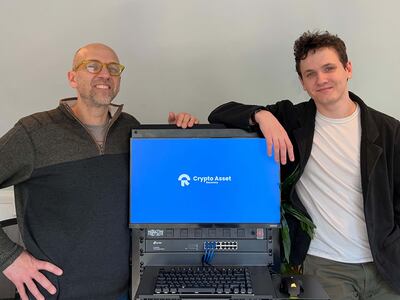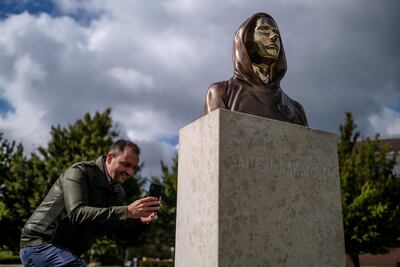The roller coaster world of cryptocurrencies has transformed the fortunes of many, not only creating a raft of new millionaires but also spawning new careers in the digital coin sector.
People are giving up their day jobs to trade cryptocurrencies full-time or to join play-to-earn games, while others are launching specialist consultancies and some even decide to start mining digital tokens.

But there is one niche in the sector that is beginning to boom after demand for cryptocurrencies soared during the height of the Covid-19 pandemic: specialists who can unlock cryptocurrency wallets, which store the digital coins, after their owners have forgotten their passwords.
It is an industry with great potential, according to Chris Brooks, 50, a programming engineer and founder of Crypto Asset Recovery.
Along with his 20-year-old son, Charlie, the Boston-based father-and-son duo have helped clients in the US and other parts of the world, including Dubai, Africa and Europe, to unlock their non-custodial digital wallets.
A non-custodial wallet, or cold wallet, gives owners sole control of their private keys or seed phrases, which are used to prove they own the cryptocurrencies it holds. This is opposed to custodial wallets, which are controlled by a third party, such as platforms like Coinbase.
founder of Crypto Asset Recovery
“The demand is seasonal, in the sense that when the price of Bitcoin is rising, people come out of the woodwork … but we get people on a weekly basis,” says Mr Brooks, who originally founded the company in 2017 and relaunched it at the end of 2020.
In the US, 39.7 per cent of cryptocurrency owners admitted to forgetting their passwords, a 2021 survey by CryptoVantage found.
However, 95.6 per cent said they had regained access to their investments, while 11.9 per cent of respondents believed their wallet passwords were not safe, the poll, which surveyed more than 1,000 cryptocurrency owners, said.
Currently, the total market capitalisation of cryptocurrencies is valued at $2.04 trillion, while Bitcoin’s market cap is about $815 billion, according to trading platform Binance.
Based on a study they conducted six months ago, Mr Brooks and Charlie estimate that 98,000 Bitcoins — which was trading at $42,856.92 on March 24 and is equal to $4.19bn — have been lost and 2 per cent, or $83.9m, of that is recoverable by helping owners crack the password to their wallets.
This means there is a decent profit to be made for companies that specialise in unearthing lost passwords and unlocking wallets, Mr Brooks and Charlie say.
“That's the rough estimation of Bitcoins that can be recovered, if their owners are motivated and follow best practices in doing so,” Charlie says.
“Essentially, we can recover any crypto asset that can be held in a non-custodial wallet,” his father adds.
Their first step in recovering a password is to work closely with a wallet owner and ask questions that range from birth dates to the way they normally set them up, such as using a password manager. They then go through all of the passwords and extract clues to help them crack open the wallet.
“When it comes to passwords, people are very particular,” Mr Brooks says. “We have them share as much as they're comfortable with about the way they make passwords, ideally, exporting a password manager such as Google passwords or LastPass.
“And then we will go through all of the passwords they've made in the past or any ideas they have for the password that they set. And we'll extract the ways they like to make passwords; the words they like to use.”
Over the past year, the Bitcoin treasure hunters have recovered a seven-figure US dollar sum of cryptocurrencies. For privacy reasons, they declined to give an exact amount.
The pair charge clients a fee that starts at 20 per cent and is based on the amount of cryptocurrency that has been recovered from a wallet.
“Right now, our fees are a little bit complicated and we are working on simplifying our structure, but they are based on percentages,” says Charlie, who has put his computer science degree on hold indefinitely to work with his father.
“For the vast majority of wallets that we work with, it’s a 20 per cent fee. But for any wallet over 10 Bitcoins, the fee starts to decrease. It's a sliding scale from 10 to 20 Bitcoins — but that's a very rare occurrence.
“If we don't recover funds, there's no fee.”

But just like the cryptocurrency world, there are some “unusual” characters who have reached out to Crypto Asset Recovery to unlock a wallet, including people claiming to be Satoshi Nakamoto, the pseudonym used by the person believed to have developed Bitcoin during the 2008-2009 financial crisis.
Craig Wright, an Australian computer scientist, claims to be the inventor of Bitcoin and says he holds 1.1 million Bitcoins. However, Mr Wright’s claim he is Nakamoto, which means “at the centre of” in Japanese, is disputed by the Bitcoin community.
“The stories as a whole are a rabbit hole as we go down,” says Mr Brooks. “We'll get people telling us that they're Satoshi Nakamoto … we get people who cover the entire spectrum of what they might be.
“We don't convert all of them because a good percentage of [requests] don't meet the criteria that we need for them to be able to work with us.”
About 50 per cent of people who contact the company have been scammed after investing in businesses that are a front for fraudsters and cannot be helped, says Charlie.
But perhaps one of their more worrying moments came last year, when they decided to travel to Savannah, Georgia, to help a client unlock what they claimed was a wallet containing 5,000 — or $44m at the time — Bitcoins, which they “won during a court case”.
“When we spoke to them over the phone, they said they were able to withdraw $300,000 a week but wanted to withdraw it all at once and just be out of the Bitcoin game,” Charlie says.
“They said, ‘Fly down tomorrow, help us move this and we will make you millionaires’ and that's a big deal for us … we decided to go for it.”
After arriving at the airport in Savannah, the pair were picked up by three “massive, intimidating” men ranging in height from about 195cm (six foot, five inches) to just over 208cm (six foot, 10 inches) — but their story started falling apart rapidly.
“We started to get a little bit worried because when we sat down, they started pulling out tablets and the $44m number had somehow inflated to $3.2bn and it was no longer in Bitcoin but Ethererum,” Charlie says.
“We spent the entire time with our two laptops sitting next to each other, combing through seed phrases in their notebooks. And we ended up finding $10 at the end of it.
“We concluded that one of the gentlemen had fallen for a common scam … where someone will sell you a public address and tell you a private key somehow controls the funds. Of course, it doesn’t.
“It ended up being a learning experience.”
Top tips to protect your cryptocurrency wallet password
1. Always work with a credible exchange, such as Coinbase or Kraken, as they act as the custodian of your funds
2. If you forget your password, this means that you can go through an identification process with the exchange and recover your funds in the wallet
3. If you want to invest in non-fungible tokens, you will need to manage your own wallet and it is critical to understand what a recovery seed phrase is — a 12-24 word phrase that represents your private key
4. Write down the seed phrase carefully and keep it in a safe place
5. It is important not to take a screenshot of your seed phrase as it is easy to accidentally send it to somebody else or upload it to another platform
Source: Chris Brooks, founder of Crypto Asset Recovery


